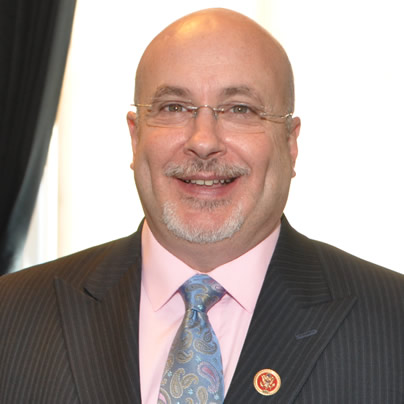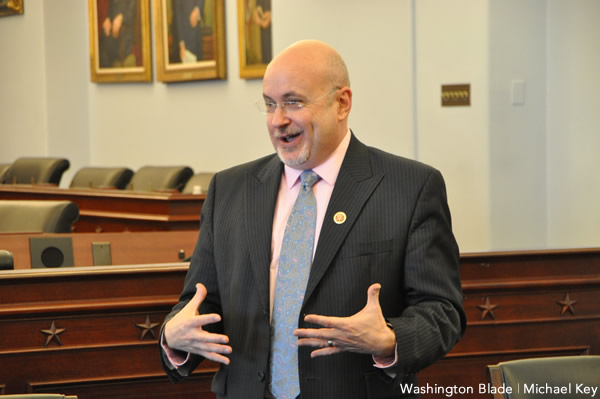National
Pocan adjusting to life as a member of Congress
Gay Wis. lawmaker seeks pro-LGBT changes in House


Rep. Mark Pocan (D-Wis.) speaks to eighth graders visiting Capitol Hill. (Washington Blade photo by Michael Key)
The Capitol Hill office of gay freshman Rep. Mark Pocan (D-Wis.) is noticeably bare as one might expect from a lawmaker who began his first term in office just a few months ago.
But on the teal walls, one item stands out: a framed picture of a 1924 campaign flier for Robert LaFollette along with a license plate advertising his bid for U.S. Senate. LaFollette, a Republican, who served in the early 20th century, formed the Wisconsin Progressive Party and is considered a leading voice of the progressive movement.
That flier and license plate are just two pieces of LaFollette memorabilia owned by Pocan, who’s an avid collector of all things related to the Wisconsin senator’s political career.
“I have over half of his known political buttons,” Pocan says. “I also have a little slide movie projector from 1924. You put it in and you have LaFollette reeler and there’s pictures. And their slogan was ‘Fearless and Incorruptible,’ which is kind of a great slogan.”
Speaking with the Washington Blade in his office, Pocan says he and his spouse of six years — Phillip Frank, with whom he operates a small printing company business in Madison — have pledged to donate their LaFollette collection to the Wisconsin Historic Society.
Any why is the Wisconsin congressman so interested in LaFollette? Pocan says the 1920s public figure resonates with him because of his work starting the progressive movement and advancing progressive causes in the state.
“In Wisconsin, we started things like unemployment compensation, so many of these national programs started in the progressive area,” Pocan says. “And he was a strong fighter. At the time, the railroads were a big monopoly, and he fought that. And he just kind of embodies what the progressive movement is about. Even here, he was recognized as a national leader for the work he did.”
In many ways, Pocan is in line with the spirit of LaFollette as a progressive leader. Representing Wisconsin’s 2nd congressional district, one of the more progressive areas in the country, Pocan serves the same constituents that lesbian Sen. Tammy Baldwin (D-Wis.) represented for 14 years before she won election to the upper chamber of Congress.
And as one of the seven openly lesbian, gay and bisexual members of Congress, Pocan personifies — and pursues — one of the most prominent causes that progressive groups have embraced in recent years: the advancement of LGBT equality.
But on this day, other issues are crowding the Wisconsin lawmaker’s schedule. His schedule includes his morning staff meeting, an audience with eighth grade students, a meeting with a legislative representative from the Area Health Education Centers in Wisconsin and lunch with House Minority Whip Steny Hoyer (D-Md.). Capping it off is a “Make It in America” news confernece with other members of Congress.
Pocan is able to find time to talk to the Blade about his experience serving in Congress for just more than 100 days. As a chair of the LGBT Equality Caucus, Pocan already has priorities for what he wants to see on LGBT issues for the 113th Congress.
While passage of any such legislation would be challenging as long as Speaker John Boehner (R-Ohio) is the presiding officer of the U.S. House, Pocan says he sees opportunities in working across the aisle. In particular, he wants to build support for legislation known as the Domestic Partnership Benefits & Obligations Act, which would provide federal workers with health and pension benefits for their same-sex partners.
A federal employee himself, Pocan found that he was unable to obtain federal benefits for his spouse, even though they were legally married in Canada, when he began his tenure in Congress — as was the person who was informing him he’d be ineligible.
“The person who was briefing me on my benefits, she and her partner don’t have benefits,” Pocan said. “So even the benefit designee, the person who’s a professional, she can’t get benefits for her partner. So, it’s a pervasive problem for federal employees. That’s an important bill, and we’ve got bipartisan support and we’re working on that so we can introduce it with strong support from day one.”
A member of the House Committee on Oversight & Government Reform, which would have jurisdiction over the legislation, Pocan says he expects introduction of the legislation next month. Although a Supreme Court ruling against the Defense of Marriage Act, which prohibits federal recognition of same-sex marriage, may make the legislation unnecessary, Pocan says plans for legislation are underway because there’s no telling how the court will rule.
In the meantime, Pocan is working within the system in Congress for greater equality for he and his spouse. The couple say they’re seeking from the House Sergeant at Arms an administrative change with the help of House Minority Leader Nancy Pelosi (D-Calif.). While his spouse was given a congressional pin that identifies him as spouse, Frank’s ID gives him the lesser distinction of designee.
“So he’s not treated equally, even though we’re legally married six-and-a-half years,” Pocan says. “So we’ve been working on that issue, trying to get that to change. For the last three months, we’ve been pushing to try to make them realize that we are legally married. What is their measure to say he’s a designee?”
Another LGBT issue that concerns Pocan is LGBT youth homelessness. That issue hits close to home; Pocan says an LGBT constituency group in Wisconsin informed him that about 400 people in Milwaukee who are homeless are LGBT youth.
Pocan says he intends to highlight an upcoming report from the Department of Housing & Urban Development to bring greater awareness to the issue of LGBT youth homelessness and has brought up the issue with the LGBT Equality Caucus.
“We realized the HUD report is coming this year, so now we’re partnering with some national groups on this, and we’re actually going to have something where we invite other national groups to Congress to talk about that,” Pocan says. “So, we’re just kind of getting that structure together to realize how we can have that magnified voice.”
The Wisconsin lawmaker comes to Congress after having served for 14 years as a member of the Wisconsin State Assembly, and, for a time, as the State Assembly Budget Committee chair, which under his jurisdiction passed a domestic partnership laws for gay couples in the state and allowed state universities to provide benefits for employees with same-sex partners. It was the first state to do so even with a draconian state constitutional amendment on the books barring same-sex marriage and marriage-like unions.
For Pocan, the most glaring difference between serving as a state lawmaker and a member of Congress is the partisanship that pervades Congress. Pocan was particularly disappointed that during freshmen training for new members of Congress, Democrats and Republicans were separated with the exception of one dinner and one reception.
“They kind of taught you bad behavior from day one,” Pocan said, “I’ve always worked on a finance committee for six of my years. I was co-chair there for two years, where I spent eight hours a day, three days a week for three or four months every other year putting a budget together with the other party and actually working on stuff.”
But Pocan has taken it upon himself to get acquainted with fellow lawmakers on the other side. One surprising person with whom he’s formed a friendship: Rep. Jim Jordan (R-Ohio), an anti-gay lawmaker who was among the chief voices calling for congressional action against the marriage equality law in D.C.
Part of their friendship is the result of Jordan attending University of Wisconsin, Madison, where he wrestled, and having kids who also attend that school.
“I signed on to his bill to keep wrestling in the Olympics because he cares about wrestling,” Pocan says. “I’m trying to build those relationships because we’ve talked about not only getting together while he’s in Madison, but he also wants to get on this one conservative radio show. I said I can get you on there, she hates me.”
Pocan can’t stay in his office speaking with the Blade long before he’s headed to his next engagement: speaking to eighth-graders from the Eagle School for Gifted Students who are on a field trip visiting Capitol Hill.
For 30 minutes, Pocan talks to the students about his job as a member of Congress and fields questions about the legislative process. Among the questions are continued funding for the U.S. Post Office and environmental issues, but he also receives a question from a student on what he can do to bring marriage equality to Wisconsin.
Pocan responds by saying the effort will be difficult because Wisconsin “put hate” in the constitution by amending it to ban same-sex marriage, but notes the progress made when domestic partnerships were enacted into law.
“It’s not full equality, but at least we were able to do something in Wisconsin,” Pocan says. “So we’ve got some minor protections in place, but I think the big thing we’re all watching is the Supreme Court case that was just heard a couple weeks ago to see what decision they make.”
The Wisconsin lawmaker urged the student to take heart because the country is moving ahead of leaders and pointed to recent polls showing a majority of the American public — and 80 percent of America’s youth — back marriage rights for gay couples.
“This is really I think a civil rights issue of our generation, and I’m hoping we’ll have good resolution with the courts, but more importantly, the public is there, we just have to get our leaders to actually lead,” Pocan said.
Pennsylvania
Malcolm Kenyatta could become the first LGBTQ statewide elected official in Pa.
State lawmaker a prominent Biden-Harris 2024 reelection campaign surrogate

Following his win in the Democratic primary contest on Wednesday, Pennsylvania state Rep. Malcolm Kenyatta, who is running for auditor general, is positioned to potentially become the first openly LGBTQ elected official serving the commonwealth.
In a statement celebrating his victory, LGBTQ+ Victory Fund President Annise Parker said, “Pennsylvanians trust Malcolm Kenyatta to be their watchdog as auditor general because that’s exactly what he’s been as a legislator.”
“LGBTQ+ Victory Fund is all in for Malcolm, because we know he has the experience to win this race and carry on his fight for students, seniors and workers as Pennsylvania’s auditor general,” she said.
Parker added, “LGBTQ+ Americans are severely underrepresented in public office and the numbers are even worse for Black LGBTQ+ representation. I look forward to doing everything I can to mobilize LGBTQ+ Pennsylvanians and our allies to get out and vote for Malcolm this November so we can make history.”
In April 2023, Kenyatta was appointed by the White House to serve as director of the Presidential Advisory Commission on Advancing Educational Equity, Excellence and Economic Opportunity for Black Americans.
He has been an active surrogate in the Biden-Harris 2024 reelection campaign.
The White House
White House debuts action plan targeting pollutants in drinking water
Same-sex couples face higher risk from environmental hazards

Headlining an Earth Day event in Northern Virginia’s Prince William Forest on Monday, President Joe Biden announced the disbursement of $7 billion in new grants for solar projects and warned of his Republican opponent’s plans to roll back the progress his administration has made toward addressing the harms of climate change.
The administration has led more than 500 programs geared toward communities most impacted by health and safety hazards like pollution and extreme weather events.
In a statement to the Washington Blade on Wednesday, Brenda Mallory, chair of the White House Council on Environmental Quality, said, “President Biden is leading the most ambitious climate, conservation, and environmental justice agenda in history — and that means working toward a future where all people can breathe clean air, drink clean water, and live in a healthy community.”
“This Earth Week, the Biden-Harris Administration announced $7 billion in solar energy projects for over 900,000 households in disadvantaged communities while creating hundreds of thousands of clean energy jobs, which are being made more accessible by the American Climate Corps,” she said. “President Biden is delivering on his promise to help protect all communities from the impacts of climate change — including the LGBTQI+ community — and that we leave no community behind as we build an equitable and inclusive clean energy economy for all.”
Recent milestones in the administration’s climate policies include the U.S. Environmental Protection Agency’s issuance on April 10 of legally enforceable standard for detecting and treating drinking water contaminated with polyfluoroalkyl substances.
“This rule sets health safeguards and will require public water systems to monitor and reduce the levels of PFAS in our nation’s drinking water, and notify the public of any exceedances of those levels,” according to a White House fact sheet. “The rule sets drinking water limits for five individual PFAS, including the most frequently found PFOA and PFOS.”
The move is expected to protect 100 million Americans from exposure to the “forever chemicals,” which have been linked to severe health problems including cancers, liver and heart damage, and developmental impacts in children.
An interactive dashboard from the United States Geological Survey shows the concentrations of polyfluoroalkyl substances in tapwater are highest in urban areas with dense populations, including cities like New York and Los Angeles.
During Biden’s tenure, the federal government has launched more than 500 programs that are geared toward investing in the communities most impacted by climate change, whether the harms may arise from chemical pollutants, extreme weather events, or other causes.
New research by the Williams Institute at the UCLA School of Law found that because LGBTQ Americans are likelier to live in coastal areas and densely populated cities, households with same-sex couples are likelier to experience the adverse effects of climate change.
The report notes that previous research, including a study that used “national Census data on same-sex households by census tract combined with data on hazardous air pollutants (HAPs) from the National Air Toxics Assessment” to model “the relationship between same-sex households and risk of cancer and respiratory illness” found “that higher prevalence of same-sex households is associated with higher risks for these diseases.”
“Climate change action plans at federal, state, and local levels, including disaster preparedness, response, and recovery plans, must be inclusive and address the specific needs and vulnerabilities facing LGBT people,” the Williams Institute wrote.
With respect to polyfluoroalkyl substances, the EPA’s adoption of new standards follows other federal actions undertaken during the Biden-Harris administration to protect firefighters and healthcare workers, test for and clean up pollution, and phase out or reduce use of the chemicals in fire suppressants, food packaging, and federal procurement.
Maine
Maine governor signs transgender, abortion sanctuary bill into law
Bomb threats made against lawmakers before measure’s passage

BY ERIN REED | On Tuesday, Maine Gov. Janet Mills signed LD 227, a sanctuary bill that protects transgender and abortion providers and patients from out-of-state prosecution, into law.
With this action, Maine becomes the 16th state to explicitly protect trans and abortion care in state law from prosecution. This follows several bomb threats targeting state legislators after social media attacks from far-right anti-trans influencers such as Riley Gaines and Chaya Raichik of Libs of TikTok.
An earlier version of the bill failed in committee after similar attacks in January. Undeterred, Democrats reconvened and added additional protections to the bill before it was passed into law.
The law is extensive. It asserts that gender-affirming care and reproductive health care are “legal rights” in Maine. It states that criminal and civil actions against providers and patients are not enforceable if the provision or access to that care occurred within Maine’s borders, asserting jurisdiction over those matters.
It bars cooperation with out-of-state subpoenas and arrest warrants for gender-affirming care and abortion that happen within the state. It even protects doctors who provide gender-affirming care and abortion from certain adverse actions by medical boards, malpractice insurance, and other regulating entities, shielding those providers from attempts to economically harm them through out-of-state legislation designed to dissuade them from providing care.
You can see the findings section of the bill here:
The bill also explicitly enshrines the World Professional Association of Transgender Health’s Standards of Care, which have been the target of right-wing disinformation campaigns, into state law for the coverage of trans healthcare:
The bill is said to be necessary due to attempts to prosecute doctors and seek information from patients across state lines. In recent months, attorneys general in other states have attempted to obtain health care data on trans patients who traveled to obtain care. According to the U.S. Senate Finance Committee, attorneys general in Tennessee, Indiana, Missouri, and Texas attempted to obtain detailed medical records “to terrorize transgender teens in their states … opening the door to criminalizing women’s private reproductive health care choices.”
The most blatant of these attempts was from the attorney general of Texas, who, according to the Senate Finance Committee, “sent demands to at least two non-Texas entities.” One of these entities was Seattle Children’s Hospital, which received a letter threatening administrators with arrest unless they sent data on Texas patients traveling to Seattle to obtain gender-affirming care.
Seattle Children’s Hospital settled that case out of court this week, agreeing to withdraw its Texas business registration in return for Texas dropping its investigation. This likely will have no impact on Seattle Children’s Hospital, which has stated it did not treat any youth via telemedicine or in person in Texas; the hospital will be able to continue treating Texas youth who travel outside of Texas to obtain their care. That settlement was likely compelling due to a nearly identical law in Washington that barred out-of-state investigations on trans care obtained solely in the state of Washington.
The bill has faced a rocky road to passage. A similar bill was debated in January, but after coming under intense attack from anti-trans activists who misleadingly called it a “transgender trafficking bill,” the bill was voluntarily withdrawn by its sponsor.
When LD 227 was introduced, it faced even more attacks from Gaines and Libs of TikTok. These attacks were followed by bomb threats that forced the evacuation of the legislature, promising “death to pedophiles” and stating that a bomb would detonate within a few hours in the capitol building.
Despite these threats, legislators strengthened both the abortion and gender-affirming care provisions and pressed forward, passing the bill into law. Provisions found in the new bill include protecting people who “aid and assist” gender-affirming care and abortion, protections against court orders from other states for care obtained in Maine, and even protections against adverse actions by health insurance and malpractice insurance providers, which have been recent targets of out-of-state legislation aimed at financially discouraging doctors from providing gender-affirming care and abortion care even in states where it is legal.
See a few of the extensive health insurance and malpractice provisions here:
Speaking about the bill, Gia Drew, executive director of Equality Maine, said in a statement, “We are thrilled to see LD 227, the shield bill, be signed into law by Gov. Mills. Thanks to our pro equality and pro reproductive choice elected officials who refused to back down in the face of disinformation. This bill couldn’t come into effect at a better time, as more than 40 percent of states across the country have either banned or attempted to block access to reproductive care, which includes abortions, as well as transgender healthcare for minors. Thanks to our coalition partners who worked tirelessly to phone bank, lobby, and get this bill over the finish line to protect community health.”
Destie Hohman Sprague of the Maine Women’s Lobby celebrated the passage of the bill despite threats of violence, saying in a statement, “A gender-just Maine ensures that all Mainers have access to quality health care that supports their mental and physical wellbeing and bodily autonomy, including comprehensive reproductive and gender-affirming care. We celebrate the passage of LD 227, which helps us meet that goal. Still, the patterns of violence and disinformation ahead of the vote reflected the growing connections between misogyny, extremism, and anti-democratic threats and actions. We must continue to advocate for policies that protect bodily autonomy, and push back against extremist rhetoric that threatens our states’ rights and our citizens’ freedoms.”
The decision to pass the legislation comes as the Biden administration released updated HIPAA protections that protect “reproductive health care” from out-of-state prosecutions and investigations.
Although the definition of “reproductive health care” is broad in the new HIPAA regulations, it is uncertain whether they will include gender-affirming care. For at least 16 states, though, gender-affirming care is now explicitly protected by state law and shielded from out-of-state legislation, providing trans people and those seeking abortions with protections as the fight increasingly crosses state lines.
****************************************************************************

Erin Reed is a transgender woman (she/her pronouns) and researcher who tracks anti-LGBTQ+ legislation around the world and helps people become better advocates for their queer family, friends, colleagues, and community. Reed also is a social media consultant and public speaker.
******************************************************************************************
The preceding article was first published at Erin In The Morning and is republished with permission.























